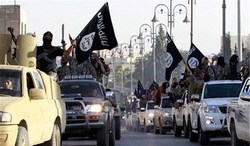 MI5 is investigating Daesh (also known as the Islamic States, ISIS/ISIL) plans to carry out a new wave of attacks across the UK and Europe using ‘crocodile cells’ made up of sleeper operatives, according to a report.
MI5 is investigating Daesh (also known as the Islamic States, ISIS/ISIL) plans to carry out a new wave of attacks across the UK and Europe using ‘crocodile cells’ made up of sleeper operatives, according to a report. RNA - It comes amid revelations that a ringleader of Sri Lanka's Easter massacre was ‘mentored’ by a group of notorious British Daesh fighters, including the killer known as Jihadi John, when travelling to Syria to prepare for the attacks, Daily Mail reported.
Abdul Lathief Jameel Mohammad, 36, who is considered by Western intelligence agencies to be one of the plot's ringleaders, blew himself up at the Tropical Inn in Colombo on Easter Sunday.
And now, experts fear the West could see more deadly "spectaculars" as Daesh, which claimed responsibility for the Sri Lanka attacks, switches tactics.
The group is said to be relying on regional cells to do its work following its military defeat in its Syria and Iraq strongholds earlier this year.
Police chiefs have urged churches and mosques in Britain to undertake counter-terrorism training over the fears of further attacks and far-right revenge plots.
It comes as security services scramble to find out any associates or signs of extremist activity during Mohammad's time in Britain which could have encouraged him onto a journey of terrorism.
Following his studies in the UK and Australia, where it is thought he formed links with local extremists, Mohammad travelled to Syria to join the murderous Islamic State group in 2014.
Once in Syria, privately educated Mohammad is thought to have become a member of a Western cell within IS called ‘the Legion’, which included among its members Mohammad Emwazi, also known as Jihadi John.
"We've seen intelligence which connects him [Mohammad] to a number of British terrorists who were in Syria, as well as to Jihadi John and Junaid Hussain, around the time that ISIS set up its caliphate," an intelligence source told The Sunday Times.
"The British jihadists seemed to be mentoring him through communication online and also when he travelled to Syria," the source added.
It is likely Mohammad only remained in the war zone for a few months, although it remains unclear when he returned to Sri Lanka to become part of an ISIL sleeper cell.
The Legion was set up to lure other English-speakers to the so-called caliphate and to encourage supporters in the West to carry out attacks.
Made up of around a dozen members, at least a third of whom were from the UK, the Legion included Junaid Hussain, a computer hacker from Birmingham, as well as Jihadi John and Neil Prakash, an Australian-born Buddhist converted to Islam.
The unit was killed in drone strikes, with one member Prakash jailed in Turkey last month after trying to flee the terror group's territory.
Charlie Winter, of the International Centre for the Study of Radicalisation at King's College London, said, "Now that ISIS has been defeated in Syria and Iraq, it will become more violent outside [this area]."
"It's a grim outlook, but we are likely to see more attempts at attacks, more regularly, for the foreseeable future. Sri Lanka was not a one-off. If anything, it was a test run," Winter noted.
On Friday, MI5 was investigating whether Mohammad had his first taste of extremism while studying at Kingston University from 2006-07.
He enrolled on an aerospace engineering degree at the Asian Aviation Centre in Sri Lanka, in which students spend their third and final year at Kingston University.
Aged 23, he arrived in the UK in January 2006, and returned to Sri Lanka in September 2007. He also visited Britain in 2008.
Mohammad's sister, Samsul Hidaya, said that after he returned from his studies at Melbourne’s Swinburne University, he was a changed man.
"My brother became deeply, deeply religious while he was in Australia," she said, adding, "He was normal when he went to study in Britain, and normal when he came back. But after he did his postgraduate in Australia, he came back to Sri Lanka a different man."
She stated that "he had a long beard and had lost his sense of humour. He became serious and withdrawn and would not even smile at anyone he didn’t know, let alone laugh".
Mohammad is thought to have been radicalised in Melbourne, after Kingston University. It is thought he formed links there with local jihadis who would go on to Syria to join IS.
He is believed to have botched his attempt to detonate his bomb at a five-star hotel and is thought to have blown himself up by accident at a much smaller guest house on Easter Sunday.
847/940